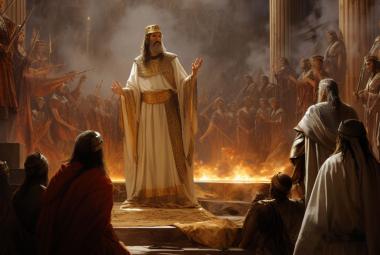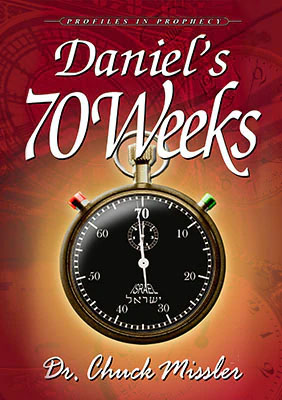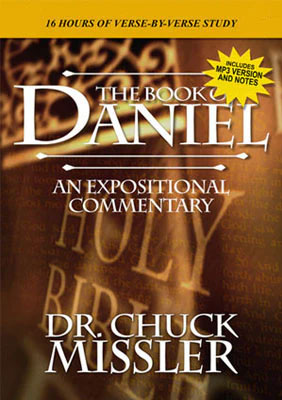The books of Ezra and Nehemiah (and Esther) cover about 100 years, closing the Old Testament historical books. The books of Samuel, Kings, and Chronicles closed with the Southern Kingdom ("Judah") going into captivity. These two post-exile books record the return from Babylon after its fall to the Persians under Cyrus, the rebuilding of the Temple and Jerusalem, and the reestablishment of the national life.
Josephus,1 Jerome,2 and the Talmud3 considered the Books of Ezra and Nehemiah as one. The Hebrew Bible also has the books together as a single work. However, there is evidence that the two books were originally separate. (The events in the Book of Esther occurred between the events recorded in Ezra 6 and Ezra 7.)
Through the protection and help of three Persian kings (Cyrus, Darius, and Artaxerxes), and the leadership of such great and godly Jews as Zerubbabel, Joshua, Haggai, Zechariah, and Ezra, the second Temple was completed and true worship restored in Jerusalem.
Cyrus was able to boast that the conquest of Babylon was almost bloodless, with no significant damage to the city. Daniel (who lived at least until the third year of Cyrus) presented to Cyrus with the writings of Isaiah, 4 which included a letter - addressed to Cyrus by name - written 150 years earlier!5 As a result, the Jews were actually encouraged by Cyrus to return to Jerusalem and to rebuild their temple. 6 Furthermore, he gave them back the vessels that Nebuchadnezzar had plundered from Solomon's Temple and he contributed financially to the construction of their second temple. Only about 50,000 Jews responded to this royal proclamation and returned to Jerusalem under the leadership of Zerubbabel. A year later, on July 23, 537 B.C., the return of Jewish exiles under Zerubbabel got underway just seventy years after the captivity began (just as Jeremiah had predicted). One of the by-products of the revival under Ezra seems to have been an ineffective effort on the part of the Jews to rebuild the walls of Jerusalem. This in turn provoked the wrath of Rehum and Shimshai, who wrote an accusation against them to Artaxerxes.7 The king commanded the work to cease until a further decree should be issued (Ezra 4:21). Rehum and Shimshai, upon receiving this decree from the king, hurried to Jerusalem and "made them to cease by force and power," presumably breaking down the wall that had been started and burning the gates (Ezra 4:23; Neh 1:3). It was the news of this fresh disaster that shocked Nehemiah and brought him to his knees before God.
Nehemiah
The Book of Nehemiah covers a period of at least twenty years, from December, 445 B.C., to about 425 B.C., when Nehemiah returned from Babylon to cleanse Jerusalem and the province of various evils that had crept in during his absence since 432 B.C. The careers of Ezra and Nehemiah overlap, as may be seen in Neh 8:1-9 and 12:26. (It is quite probable that Malachi prophesied during the governorship of Nehemiah, for many of the evils he denounced are found to be prominent in the Book of Nehemiah.)
Nehemiah served as cupbearer to Artaxerxes I, the son of Ahasuerus (Xerxes), who took Esther to be his queen. Nehemiah's obtaining authorization to rebuild the walls and city of Jerusalem was the very decree that Gabriel had predicted to Daniel 95 years earlier in 539 B.C. This decree was issued on March 14, 445 B.C. and would trigger the most astonishing prophecy in the Old Testament: The Seventy "Weeks" of Daniel Chapter 9.8 The example of Nehemiah's passion for the truth of God's Word, whatever the cost or consequences, is an example sorely needed in this present hour. May the prayerful study of this book lead more of God's people today to "earnestly contend for the faith which has been delivered unto the saints."
Notes:
- Josephus, Against Apion 1. 8.
- Jerome, Preface to the Commentary on Galatians.
- Baba Bathra 15a.
- Josephus, Antiquities XI, i.2.
- Isaiah 44:27 - 45:7.
- 2 Chronicles 36:22; Ezra 1:1-4.
- Ezra 4:7-16.
- See our briefing, The Seventy Weeks of Daniel, or our Expositional Commentary on Daniel for a complete discussion of this amazing prophecy.








